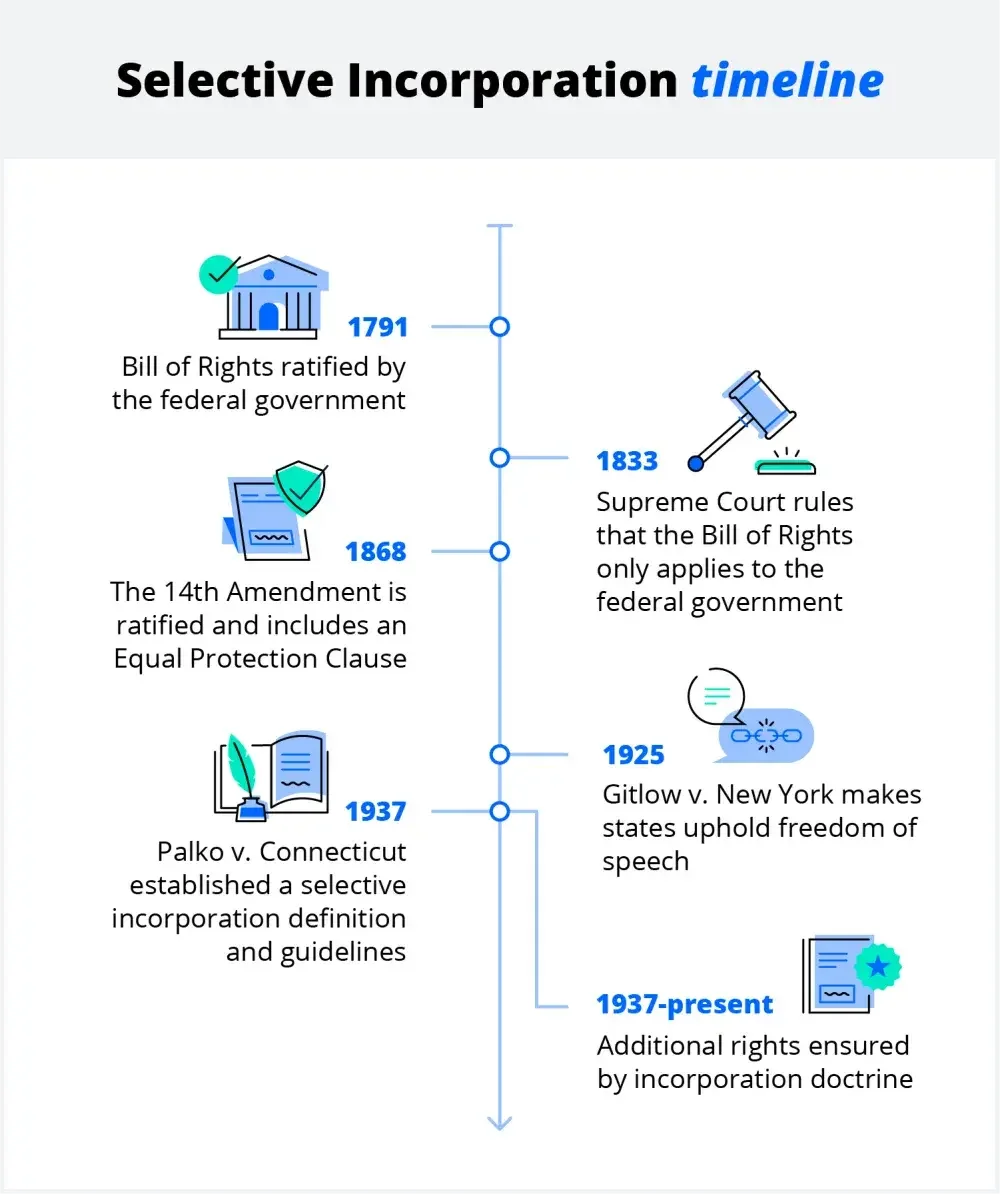Selective incorporation is the legal principle of how Bill of Rights protections apply to states. On the surface, selective incorporation may sound like a way of filing legal incorporation forms to create a new business, but the incorporation doctrine isn't a business concept. It's a legal concept that shapes constitutional rights.
To help you understand the selective incorporation definition, we'll explain its history, famous court cases, and protections.

What is selective incorporation?
Selective incorporation is a constitutional law principle that refers to the way selected provisions of the Bill of Rights apply to each state through the equal protection clause of the 14th Amendment. The “selective" part comes from the fact that the U.S. Supreme Court incorporates these rights on a case-by-case basis.
Why does selective incorporation matter?
Selective incorporation ensures that Bill of Rights provisions apply in every state. The Bill of Rights is another name for the first 10 amendments to the U.S. Constitution.
These amendments establish many fundamental rights, including:
- Freedom of religion
- Freedom of the press
- The right to a jury trial
- The right to bear arms
- Protections against unreasonable search and seizure
- The privilege against self-incrimination
Difference between the incorporation doctrine and selective incorporation
Both selective incorporation and the incorporation doctrine refer to the same general concept. That said, their usage can slightly distinguish them:
- Selective incorporation refers to the case-by-case approach of deciding which portions of the Bill of Rights apply to states.
- Incorporation doctrine refers to the general concept that states cannot deny citizens protections mentioned in the Bill of Rights.
Some legal experts might argue selective incorporation is a type of incorporation doctrine. However, you will often hear people use these terms interchangeably.
When selective incorporation comes into play
Selective incorporation comes up when states pass amendments or policies that are alleged to infringe on Bill of Rights protections. Two amendments play a key role in incorporating rights:
- The Fifth Amendment ensures Bill of Rights protections on the federal level.
- The 14th Amendment defends these rights on the state level.
A brief history of the Bill of Rights

The original draft of the Constitution detailed the powers of the new American government, but it did not guarantee that the government would not infringe on citizens' rights. Some states would only ratify the Constitution if it also restricted the federal government's power.
As a result, the federal government adopted the Bill of Rights in 1791. Because the Bill of Rights restricted federal powers, it initially only applied to the federal government. In 1833, the Supreme Court specifically held that Bill of Rights protections did not apply to state governments.
The Bill of Rights before the incorporation doctrine
For the next century, states could—and did—pass laws that violated protections such as freedom of speech and freedom of the press.
The 14th Amendment, ratified in 1868, forbade states from denying anyone life, liberty, or property without due process of law. But it was another 57 years before the 14th Amendment's due process clause extended guarantees in the Bill of Rights to the states.
Selective incorporation of the Bill of Rights to the states
In the 1925 case Gitlow v. New York, the Supreme Court held that states must protect freedom of speech. Since then, a series of court decisions have applied some, but not all, of the individual protections in the Bill of Rights to state governments.
To this day, Supreme Court cases may expand the Bill of Rights' purview to new states and legal contexts.
The debate over selective vs. total incorporation
Supreme Court justices have historically had different opinions about the incorporation doctrine.
- Some justices have believed the 14th Amendment's due process clause should apply to the entire Bill of Rights. They advocated for total incorporation of the Bill of Rights. This would force states to recognize all of the same protected actions as the federal government.
- Other justices advocated selective incorporation of only certain portions of the Bill of Rights. They argued that incorporating all protections would place an undue burden on states.
Supreme court cases and rulings
Ultimately, the Supreme Court adopted the selective incorporation doctrine in the 1937 case of Palko v. Connecticut. That decision rejected total incorporation and established a selective incorporation definition and guidelines for applying it.
- Gitlow v. New York (1925): Legally established selective incorporation on the state level by extending first amendment protections for free speech.
- Cantwell v. Connecticut (1940): Strengthened protections on religious speech.
- Brown v. The Board of Education (1954): Found that school segregation violated the Equal Protection Clause of the 14th Amendment.
- Gideon v. Wainwright (1963): Guaranteed the Sixth Amendment right to an attorney in state courts.
- Tinker v. Des Moines Independent Community School District (1969): Codified students' First Amendment rights in public schools.
- Roe v. Wade (1973): Outlined an implicit right to privacy.
- McDonald v. Chicago (2010): Incorporated the Second Amendment right to bear and keep arms across states.
Rights that apply to states through the process of incorporation
Over the years, a series of court decisions have applied most, but not all, of the Bill of Rights protections to the states. Among them are:
- The First Amendment's freedom of speech, press, and religion
- The Second Amendment's right to bear arms
- The Fourth Amendment's ban on unreasonable search and seizure
- The Fifth Amendment's privilege against self-incrimination
- The Sixth Amendment's right to a speedy trial
- The Eighth Amendment's protection against cruel and unusual punishment
Bill of Rights protections not applying to states yet
A few of the protections in the Bill of Rights aren't incorporated into states, including:
- The Third Amendment, which restricts the quartering of soldiers in private residences without the owner's consent
- The Sixth Amendment's right to a jury selected from residents of the state and district where the crime allegedly occurred
- The Seventh Amendment, which guarantees a jury trial in civil cases involving more than $20
- The Eighth Amendment's protection against excessive fines
Limits on state power
Opponents of selective incorporation argue it places a blanket limit on state power. However, the incorporation doctrine has a more narrow focus than that. Specifically, it limits states' regulation of civil rights and liberties. The incorporation doctrine only comes up when state laws are found to violate Bill of Rights protections.
Incorporating rights on all levels
Over the past century, the doctrine of selective incorporation has extended most of the Bill of Rights to protect citizens against state and federal government actions. So with only a few exceptions, states cannot enact laws violating the Bill of Rights' fundamental protections.
To learn more about U.S. law and government authority, check out our list of attorney services. Our experts can answer questions on everything from the definition of selective incorporation to litigation, estate planning, and more.

